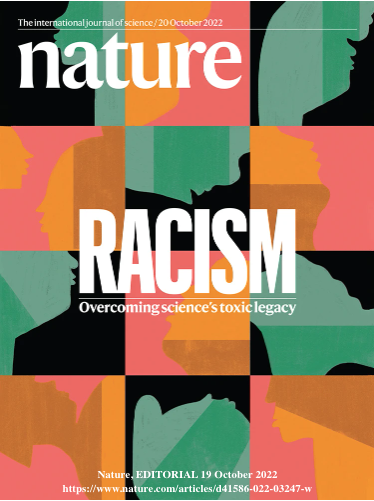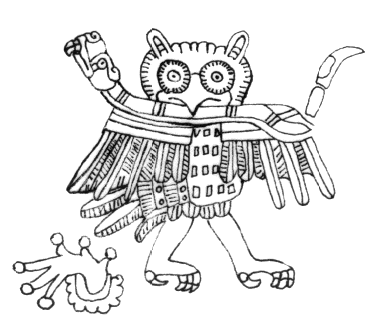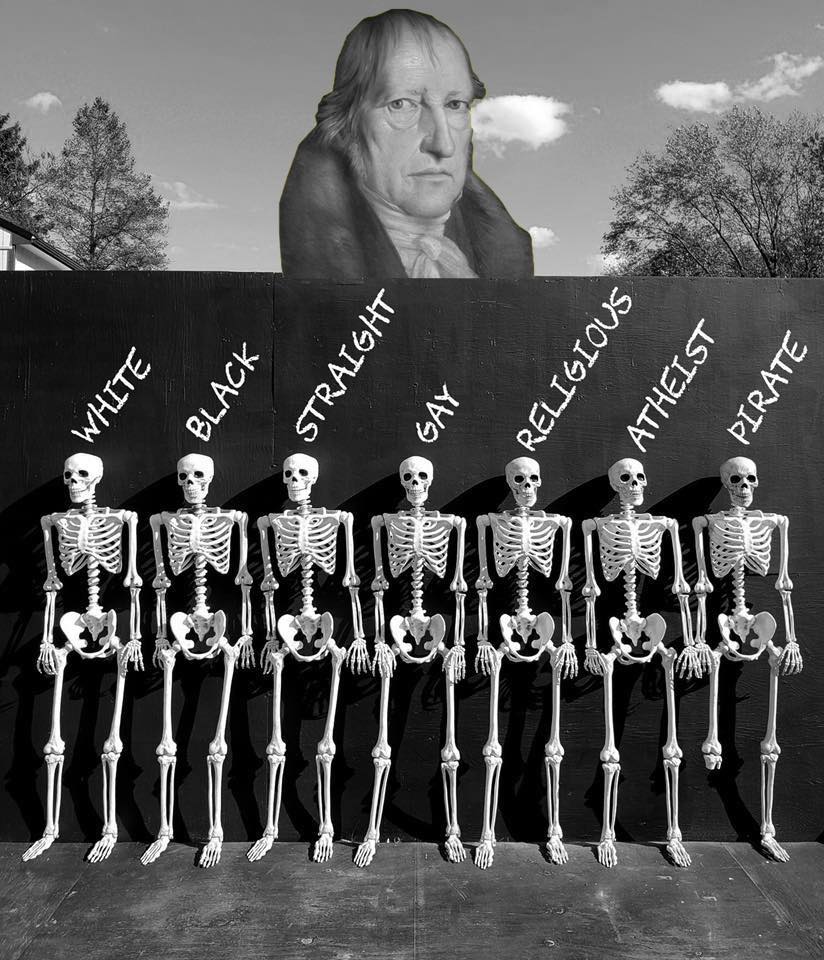人種主義と戦う科学雑誌『ネイチャー』
Nature, a scientific journal that fights racism

解説:池田光穂
人種主義と戦う科学雑誌『ネイチャー』
Nature, a scientific journal that fights racism

解説:池田光穂
●人種主義に終止符を打つことが科学向上の決め手(Nature, EDITORIAL 19 OCTOBER 2022)
以下は『ネイチャー』誌 2022年10月19日号に、寄稿された編集部記録(EDITORIAL)です。「人種主義に終止符を打つことが科学向上の決め手」と明確に、同誌が人種主義に反対するものだと、主張しています。
| Ending racism is key to better science: a message from Nature’s guest editors This special issue is our ‘message in a bottle’ from the troubled ship of science. We urge readers to find it. Open it. Act on its contents. By Melissa Nobles, Chad Womack, Ambroise Wonkam & Elizabeth Wathuti | 人種主義に終止符を打つことが科学向上の決め手(Nature,
EDITORIAL 19 OCTOBER 2022) この特別号は、困難な状況にある「科学」という船からの「瓶入りのメッセージ」です。この瓶をどうか見つけて瓶を開け、メッセージの内容に基づいて行動し てください。 |
| In 1768, the UK Royal Society
commissioned a research ship, HMS Endeavour, to sail to Tahiti in time
to witness a transit of Venus across the Sun. But, as researchers later
discovered, the UK government and the society had an extra purpose for
the voyage: the ship’s captain, James Cook, had been given secret
instructions to continue onwards in what became Britain’s colonial
takeover of Australia and New Zealand. This is not an isolated example of a scientific effort that owes its existence to the racist exploitation of humanity. Everyday statistical concepts such as correlation and regression to the mean came out of eugenics, the discredited science of ‘improving’ humans through selective breeding. Science’s history is enmeshed with racism and colonization. It should not have needed the murder of George Floyd, yet one more Black man killed at the hands of police, for such truths to be restated, as Nature and other scientific journals did in June 2020. More than a year ago, at Nature’s request, we agreed to become guest editors leading this special issue on racism in science. We have been given complete editorial freedom; this June, we wrote the first editorial in the journal’s history to be signed by external authors, announcing our involvement (M. Nobles et al. Nature 606, 225–227; 2022). The content you can read, listen to and watch in this collection is the result of intensive collaboration between the four of us and Nature’s editorial, art and design, engagement, multimedia, production, administration and communication teams, as well as commissioned writers. A connection to Africa Each of us knows all too well the discrimination that Black and Indigenous people and others from historically marginalized communities face in science and engineering. Yet racism so devalues human lives that inequitable treatment is often invisible to those in power. Many of us will not often openly express our fears and frustrations, or we will be guarded about them in the institutions where we work. In a series of profiles, you can glimpse the brave testimonies of five individuals who have chosen to speak out: surgeon Nadine Caron; Earth scientist Martha Gilmore; geoscientist Christopher Jackson; health researcher Chelsea Watego and paediatrician Nadia Sam‑Agudu. Each of the guest editors has a connection to Africa. For two of us, C.W. and M.N., the continent is a place where our ancestral connection was violently separated. Because of the transatlantic trade in enslaved people, aided by Europe’s empires, it is practically impossible for us to know which village or town in east, west, central or southern Africa our ancestors were taken from. Most people could not imagine not knowing who they are or where they come from, but this is a lived reality for millions of us. This tragedy was compounded by our systematic exclusion from education and science. And yet, such has been our thirst for knowledge that formerly enslaved people in the United States, denied the right to learn, took the responsibility of building entirely independent educational institutions; there are now around 100 historically Black colleges and universities in the United States, educating some 300,000 students. Slavery and empire also robbed two of us, A.W. and E.W., of our agency, our traditions of learning, our scholarship and our histories. The science and technology that came after the Industrial Revolution did little to involve formerly enslaved and colonized peoples, even while scientists from colonizing nations researched and innovated from our traditions, our knowledge and our natural resources. The Industrial Revolution itself created an unequal world. It is the leading cause of historical greenhouse-gas emissions, which are devastating lives and livelihoods in formerly colonized countries. Every Nature reader will know that rigorous, authoritative and, frankly, honest science is research that studies, builds on but also acknowledges what came before. However, for too long, science’s textbooks, along with the author and reference lists in research papers, have neglected to include Black, Indigenous and other historically marginalized peoples. That is why it is so important for science curricula, research and academic spaces to go through decolonization processes. These are not political or ideological acts, but part of science itself — an example of science’s self-correcting mechanism in the pursuit of truth. Science must at the same time become open to bringing in new voices and new points of view, and to working genuinely collaboratively with scientists from Black, Indigenous and historically marginalized communities. There has to be space for more than one story, one explanation, one perspective. If this point can be fully appreciated, it will further open the aperture of the scientific imagination and set the world on course to finally eradicating the ways in which racism so devalues human lives. It has been a new and enlightening experience for us to go behind the scenes in the production of this package. We appreciate the opportunity to speak collectively in our own voices and from our own experiences. It has been empowering, and we hope it will lead to concrete results. Through this process, we and the writers that Nature commissioned have lent our expertise and lived experience in the hope and expectation that the institution of science (researchers, universities, funders, policymakers, publishers) will accept the necessity of decolonizing research and work towards restorative justice and reconciliation. This special collection is our message in a bottle. Alongside the broader research community, we hope more journals and publishers will find it, extract it and, together with Nature, use the power of their combined platforms to lift up more diverse voices. We are ready to play our part. This must be the start of the journey for that message, and not its final destination. Nature 610, 419-420 (2022) doi: https://doi.org/10.1038/d41586-022-03247-w |
1768年、英国王立学会は、金星の太陽面通過を観測するために調査船エンデバー号をタヒチ島へ航行させました。実は後の研究で、英国政府と王立学会には もう1つ目的があったと分かりました。ジェームズ・クック船長は、航海を続けて、オーストラリアとニュージーランドの植民地支配のきっかけをつかむという 秘密指令を受けていました。 人種主義的搾取を受けた人々が存在したから科学的活動が存在できたという事例はまだあります。相関、平均値への回帰といった統計的概念は、既に信用を失っ た優生学に由来します。優生学は、選択交配によって人類を「改良」するという科学でした。科学の歴史は、人種主義と植民地建設と絡み合っています。この真 実は2020年6月にNatureなどの科学雑誌で再記述されましたが、そのためにさらに1人の黒人男性ジョージ・フロイドが警察の手で殺される必要はな かったはずです。 厳密で権威があり、誠実であるべき科学とは、それまでにあったことも受け入れて行われる 私たち4人は、1年以上前にNatureの要請を受けて、科学における人種主義に関する特別号(2022年10月20日号)を主導する客員編集者となるこ とに同意しました。私たちは完全に編集の自由を与えられ、2022年6月にNature史上初の社外執筆者による署名入り社説を執筆し、同誌への関与を発 表しました。特別号において読者の皆さまが読み、聴き、見ることのできるコンテンツは、私たち4人と編集、アート・デザイン、エンゲージメント、マルチメ ディア、制作、管理、コミュニケーションの各チームと、委嘱執筆者との集中的な共同作業の成果です。 アフリカとのつながり 私たち1人1人は、黒人や先住民をはじめとする歴史的に疎外されてきたコミュニティー出身の人々が科学や工学の分野で直面した「差別」を嫌というほど知っ ています。しかし、人種主義は人命の価値を貶めるため、権力者は不公平な扱いが存在していることを認識できない場合が多いのです。今後も職場では、私たち の多くは、自分たちが感じる恐怖やフラストレーションをあまり表に出しませんし、そのことについての発言には慎重になることでしょう。そうした中、発言す ることを選んだ5人の勇敢な証言を、Feature記事(Nature 2022年10月20日号434ページ)で垣間見ることができます。その5人とは、外科医のナディーン・キャロン(Nadine Caron)、地球科学者のマーサ・ギルモア(Martha Gilmore)、地学者のクリストファー・ジャクソン(Christopher Jackson)、保健研究者のチェルシー・ワテゴ(Chelsea Watego)と小児科医のナディア・サム-アグデュ(Nadia Sam-Agudu)です。 客員編集者の1人1人は、アフリカとつながりがあります。2人の客員編集者(ウォーマックとノーブルズ)にとってアフリカ大陸は、祖先とのつながりを暴力 的に断たれた場所です。欧州の諸帝国の後ろ盾により大西洋横断の奴隷貿易が行われた結果、祖先がアフリカのどの地域のどの村や町から連れてこられたかを我 々が知ることは、ほぼ不可能になりました。自分が誰で、どこから来たかも分からないなんて、大部分の人には想像もつかないことかもしれませんが、これこそ 我々数百万人が生きてきた現実です。この悲劇は、我々が教育と科学から制度的に排除されたことでさらに深刻化しました。それにもかかわらず、かつて米国で 奴隷にされ、学習の権利を否定された人々は、完全に独立した教育機関を構築する責任を自ら引き受け、それを実現しました。その背景には、知識への渇望が あったのです。現在、米国には古くからの黒人大学が約100校あり、約30万人の学生を教育しています。 2人の客員編集者(ウォンカムとワトゥティ)にとって奴隷制度と帝国は、我々の行為主体性や学問の伝統、学識、歴史を奪い去った存在です。産業革命後にも たらされた科学と技術には、かつて奴隷だった人々や旧植民地の人々が関わる余地がほとんどありませんでした。その一方で、植民地支配した国々の科学者たち は、我々の伝統、知識、天然資源をもとに研究を行い、技術革新を図ったのです。 それに、産業革命自体が不平等な世界を作り出しました。産業革命は、これまでの温室効果ガス排出の主たる原因であり、温室効果ガスの排出は、旧植民地諸国 の人々の生命と生活を破壊しています。 科学のカリキュラムや研究機関と大学が、脱植民地化の数々のプロセスを経ることが重要 厳密で権威があり、(率直に言わせてもらえば)誠実であるべき科学とは、何があったかを調べて発展を図るだけでなく、それまでにあったことも受け入れて行 われる研究のことだと、Natureの読者の皆さまはご存じのことと思います。しかし、科学の教科書や、研究論文の著者リストや参考文献リストに、黒人や 先住民をはじめとする疎外されてきた人々が記載されない状態が、あまりにも長い間続きました。そのため、科学のカリキュラムや研究機関と大学が脱植民地化 というプロセスを経ることが非常に重要なのです(2022年10月20日号593ページ)。このプロセスは、政治的な行為でもイデオロギー的な行為でもな く、科学そのものの一部であり、真実を追求する科学の自己修正機構の一例です。 それと同時に科学は、新しい声や新しい視点を取り込むこと、そして黒人や先住民などの歴史的に疎外されてきたコミュニティー出身の人々と真に協力して活動 することに対して、開かれたものにならなければなりません。1つのストーリー、1つの説明、1つの視点にとらわれない空間が必要なのです。それが十分に認 識されれば、科学的想像力はさらに開かれ、人種主義によって人命の価値が貶められることは、最終的に根絶へと向かうでしょう。 この特別号の制作舞台裏での活動は、私たちにとって新しい経験であり、啓発的な経験でした。私たち4人は、自分自身の声で、自分自身の経験に基づいて、ま とまって発言する機会を得られたことに感謝しています。この経験は私たちに力を与えるものであり、この経験を具体的な成果につなげていきたいと考えていま す。特別号の制作過程を通じて、私たち4人とNatureに委嘱された執筆者たちは、科学の制度(研究者、大学、研究助成団体、政策立案者、出版社)が研 究の脱植民地化の必要性を受け入れ、修復的正義と和解に向けて取り組むことを期待して、自らの専門知識と現実の経験を持ち寄りました。 特別号は、私たち4人が瓶に託したメッセージです。私たちは、より広範な研究コミュニティーとさらに多くの学術誌や出版社が私たちのメッセージに気付き、 その内容を引き出し、Natureと力を合わせて統合的なプラットフォームを構築し、その力を利用して、より多様な声を取り上げることを期待しています。 私たちは、自らの役割を果たす準備ができています。特別号は、この瓶入りメッセージにとっての旅の始まりでなければならず、最終目的地となってはならない のです。 翻訳:菊川要 Nature ダイジェスト Vol. 20 No. 1 DOI: 10.1038/ndigest.2023.230105 |
遺骨返還にかかわる市民との対話のプロセスのなかで、期せずして、自分のたちの学問が、これまでの日本の科学的レイシズム(人種主義)をひょっとしたら学問的に支えていたのではないか?と自覚しつつある人類学者の人の良心に訴えます。ネイチャーのこのエディトリアルの、意見は、海の向こうの嵐なのか?それとも日本でもすでに暴風雨は襲来しているのでしょうか?
つづきは「科学人種主義(→科学が正当化する人種差別主義)」でどうぞ!!
人種主義に対する科学的な批判
優生学的レイシスト
ナチスドイツの人種主義政策
ネイチャーの記事から(原文:英語)
文献
その他の情報

Copyleft, CC, Mitzub'ixi Quq Chi'j, 1996-2099
ニュールベング法(1935)
The Nuremberg Laws (German: Nürnberger Gesetze) were antisemitic and racist laws in Nazi Germany.
みんな同じという「イデオロギー」・イメージ(現代)